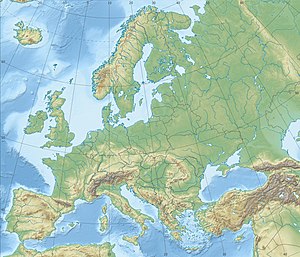
Back Bataille du Saint-Gothard French Сражение за Сен-Готард Russian Битка код Светог Готхарда (1799) Serbian
| Battles at the Saint-Gotthard | |||||||
|---|---|---|---|---|---|---|---|
| Part of Suvorov's Swiss campaign in the war of the Second Coalition | |||||||
 Suvorov's army crosses St. Gotthard Pass in 1799 by Alexander Kotzebue | |||||||
| |||||||
| Belligerents | |||||||
|
|
| ||||||
| Commanders and leaders | |||||||
|
|
| ||||||
| Strength | |||||||
|
21,000–23,285
|
7,501–9,000
| ||||||
| Casualties and losses | |||||||
| 2,000–6,000 including the St. Gotthard Pass, Oberalpsee, Hospital, Urseren valley, Devil's Bridge[d] |
2,000 including the St. Gotthard Pass, Oberalpsee, Hospital, Urseren valley, Devil's Bridge[4][1][7] 10 guns[4] | ||||||
Location within Europe | |||||||
Austria
The battle of (the) Gotthard Pass, also known as the battle of the St. Gotthard Pass or the battle of the St. Gotthard (Russian: Сражение за Сен-Готард; 24 September 1799), saw an Imperial Russian army commanded by Field Marshal Alexander Suvorov supported by two Austrian brigades attack a French division under General of Division Claude Lecourbe. The same day brought clashes at the Oberalp Pass and Hospental (archaic Hospital[1]).
The Austro-Russian army successfully captured the Gotthard Pass after stiff fighting on the first day. Suvorov's main body was assisted by a Russian flanking column led by Lieutenant General Andrei Rosenberg and a smaller Austrian flanking column under General-major Franz Xaver von Auffenberg. The next day, Suvorov's army fought its way north along the upper Reuss River valley past the Teufelsbrücke (Devil's Bridge) in Schöllenen Gorge. By 26 September the army reached Altdorf near Lake Lucerne. The term summarises a total of five battles or engagements between Airolo and Altdorf fought against the retreating French troops over the course of three days. The main engagement of 25 September is known as the battle of the Devil's Bridge. Simultaneously, the combat of the Urnerloch took place.[e]
Suvorov's offensive was part of a misbegotten Allied strategy that planned to unite the Russian armies of Suvorov and Lieutenant General Alexander Korsakov near Zürich. Together with Austrian and Swiss forces led by Feldmarschall-Leutnant Friedrich Freiherr von Hotze, they would sweep General of Division André Masséna's French Army of Helvetia from Switzerland. However, on 25–26 September, Masséna drubbed Korsakov in the Second Battle of Zurich and General of Division Jean-de-Dieu Soult defeated Hotze in the Battle of Linth River. Two smaller Austrian columns were also turned back by French forces. Instead of advancing to help Allied forces, Suvorov's army was marching into a mountainous country controlled by French troops.
- ^ a b c d e f g Bodart 1908, p. 343.
- ^ Duffy 1999, pp. 165–166.
- ^ Duffy 1999, p. 183.
- ^ a b c d Smith 1998, pp. 168–169.
- ^ Phipps 2011, pp. 142, 143.
- ^ Duffy 1999, p. 167.
- ^ a b c d Clodfelter 2017, p. 108.
- ^ Duffy 1999, p. 171.
- ^ Phipps 2011, p. 153.
Cite error: There are <ref group=lower-alpha> tags or {{efn}} templates on this page, but the references will not show without a {{reflist|group=lower-alpha}} template or {{notelist}} template (see the help page).

